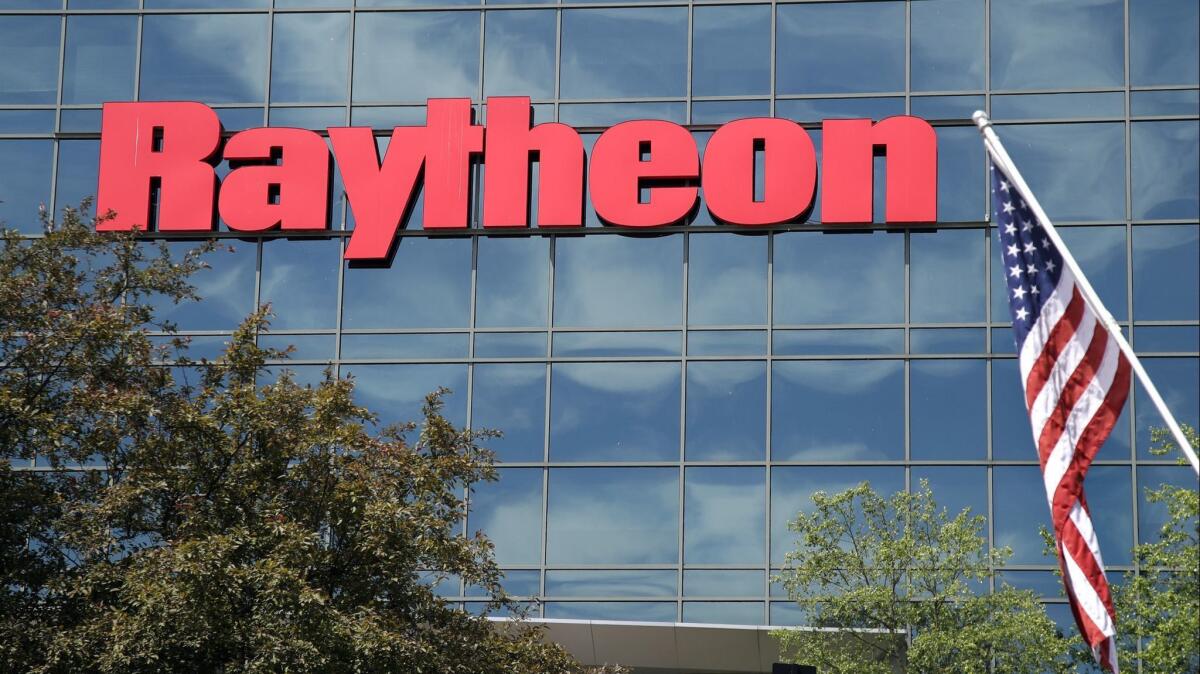Mega-deal between United Technologies and Raytheon upends the aerospace playing field

- Share via
No aerospace and defense company has bet bigger on the benefits of scale than United Technologies Corp. Its mega-deal with Raytheon Co. should be a wake-up call to rivals.
United Technologies is merging with Raytheon in an all-stock transaction that will create a behemoth with about $75 billion in sales spanning jet engines, airplane seats, missile-defense systems and radar technologies. There have been only four aerospace and defense deals valued at more than $10 billion in the last decade, and United Technologies now accounts for three of them. As for the others, Boeing Co. spent more on publicly disclosed aerospace mergers and acquisitions over that period than either General Electric Co. or Honeywell International Inc., reflecting a push to bring more of its supply chain in house.
Both Honeywell and GE have their reasons for sitting out the mergers and acquisitions rush. After Honeywell then-Chief Executive David Cote made a failed attempt at merging with United Technologies in 2016, his successor Darius Adamczyk has preferred to focus on streamlining his company and making small, strategic software bets. And although new GE CEO Larry Culp has talked a lot recently about eventually playing “offense” via mergers and acquisitions, the company’s power unit remains mired in a slump and off-balance-sheet liabilities still loom large.
As aerospace giants grow, suppliers find ‘their largest customer may be their largest competitor’ »
GE’s challenges were just starting to come to light when United Technologies CEO Greg Hayes made a $30-billion play for Rockwell Collins Inc. in 2017. Some speculated that the sidelining of GE as a counterbidder was one reason he decided to jump on the opportunity. Nearly two years later, GE is still nowhere near healthy enough to contemplate a credible competing offer for Raytheon. But the consolidating landscape may prompt both it and Honeywell to think more aggressively about deal making.
United Technologies is still in the process of integrating the Rockwell Collins purchase, which closed late last year. Management is apt to be distracted as it juggles that process, the Raytheon deal and a plan to spin off its Carrier building-controls and Otis elevator units. There may be an opportunity in the short term for the company’s rivals to pick up market share.
Honeywell’s Adamczyk has made the argument that scale doesn’t matter nearly as much as the quality of the product and has said he feels comfortable with how his company has differentiated itself. There’s some validity to that. But pressure will grow on small and midsize aerospace suppliers to merge to stay relevant. And the sheer breadth of the United Technologies-Raytheon-Rockwell Collins business will make it difficult for even the biggest companies to simply stand pat.
For one, United Technologies now has all the right pieces to become a clear leader in the race to develop connected aircraft. The Rockwell Collins deal gave it expertise in avionics, essentially the brains of the airplane. Raytheon will give it cybersecurity expertise, helping to solve one of the key concerns airlines have about digitizing parts of their planes. Honeywell has made its own impressive inroads into the digital realm via its GoDirect software services, crowd-sourced radar and wireless connectivity tools, but it will now have to contend with much fiercer competition.
Boeing, too, had been hoping for a piece of the burgeoning connected-aircraft market. Stifel Financial Corp. analyst Joseph DeNardi said he had long seen the company as a possible acquirer of Raytheon. But the cash-flow drain precipitated by the grounding of the company’s 737 Max jet makes large-scale mergers and acquisitions untenable right now, and the ensuing crisis has raised questions about whether Boeing should even be allowed to further tighten its grip on the aerospace market.
The deal some investors still dream about is a combination of Honeywell and GE’s aviation units. Even combined, the companies would still trail the sales volume of a merged United Technologies-Raytheon, but it would go a long way toward catching them up. There are also plenty of reasons to think a Honeywell-GE aerospace merger wouldn’t happen. It would be enormously complicated, particularly when it comes to determining an appropriate valuation for a GE aviation unit for which the company’s own investors have wildly different estimations.
Honeywell’s Adamczyk has already successfully resisted calls from activist investor Dan Loeb to carve out the aerospace unit into a separate entity, although arguably his software investments could go a lot further if applied to a more focused company. An alternative may be for Honeywell or GE to copy United Technologies’ playbook and increase their exposure to the defense industry. The union of Raytheon and United Technologies has called attention to the dearth of commercial exposure at Northrop Grumman Corp. and Lockheed Martin Corp., said Bloomberg Intelligence analyst Douglas Rothacker.
Any further consolidation in the aerospace and defense sector may be predicated on antitrust regulators’ view of the United Technologies-Raytheon combination. The companies say they have very little overlap and are promising to share half of their targeted $1 billion in cost savings with their U.S. government customers. But President Trump expressed some concern about the merger to CNBC on Monday, questioning whether it may damp competition for military projects.
Either way, the willingness of United Technologies CEO Hayes to pursue such a dramatic rethink of his company has already radically changed the game for aerospace and defense companies. His rivals probably will have to change as well to keep pace.
Sutherland writes a column for Bloomberg.
More to Read
Inside the business of entertainment
The Wide Shot brings you news, analysis and insights on everything from streaming wars to production — and what it all means for the future.
You may occasionally receive promotional content from the Los Angeles Times.









